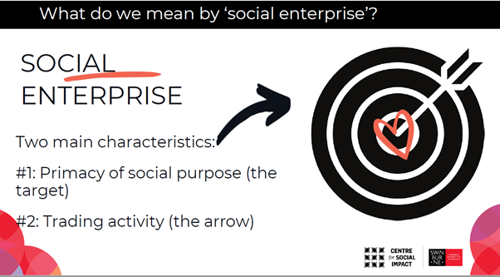Social enterprises play a valuable role in the economic, environmental and social wellbeing of the community. While they may operate like any other business, social enterprises exist to create social or environmental impact. They operate to benefit the public and the community, rather than shareholders and owners.
We understand the value and impact social enterprises have in addressing social needs and strengthening communities.
Social enterprises are innovators. They create social and economic value by applying unique market solutions. We appreciate this dual value and recognise the importance of supporting this sector to thrive.
Our diverse local economy is currently home to 20 existing or developing social enterprises. To achieve their social or environmental purpose, the primary source of income for these businesses is through commercial activity.
We maintain a directory of social enterprises. These businesses employ more than 210 employees and provide more than 600 volunteer roles.
Read about the social and environmental goals they are working towards
- Creating meaningful jobs and employment pathways for people who face barriers.
- Empowering migrant communities with essential life skills, fostering inclusivity and enhancing their overall wellbeing.
- Supporting wellbeing at home and equity of access to services, including transport.
- Delivering a holistic approach to addressing the water safety and swimming needs of diverse communities.
- Reusing waste and diverting from landfill.
- Tackling poverty for children and families, while providing skilled training and employment opportunities.
- Fostering First Nations people's connection to Country, as well as revegetation and conservation.
- Improving participation in sport.
- Providing employment for people with disability.
Visit our Social Enterprises Directory
What is a social enterprise?
A social enterprise has two main characteristics.
- Their primary purpose, or target, is a social goal.
- They achieve that goal through their trading activity.

What are the different types of social enterprise?
There are three main social enterprise types. Each type of enterprise will liklely have a specific focus.
- Employment: overcoming barriers to work
- Access: people get what they need regardless of income, location or community
- Funding: financially supporting social programs( while operating sustainably and ethically.
Each type of social enterprise will require a different business model.

Social enterprises are commercially viable businesses existing to benefit the public and the community, rather than shareholders and owners. In Australia, social enterprises take on a range of organisational legal structures. This can make it difficult to distinguish them from other organisations. Australia's certifier of social enterprises, Social Traders, bases its definition on research conducted with Swinburne University's Centre for Social Impact.
Under this definition, a social enterprise:
- has a defined primary social purpose, environmental or other public benefit
- derives a substantial portion of its income from trade
- reinvests 50% or more of annual profits towards achieving the social purpose.
Explore more definitions of social enterprise
Social Traders 2023 report PACE23 captured the scope and size of Australia’s certified social enterprises.
According to the report, the Australian social enterprises spend $690 million on delivering their impact each year. It found more than 75% of their revenue came from their commercial activities.
Supported employment
The PACE23 report also found that almost half the people employed in certified social enterprises would otherwise be shut out of work.
White Box Enterprises, which works to overcome barriers to employment, ran a comparative study on the effectiveness of social enterprises and Disability Employment Services (DES) in supporting people back into the labour market. It found social enterprises out-performed DES on retention, individual earnings and cost savings to government.
The study found:
- employee retention after 26 weeks with a social enterprise was 86% compared to 37% for DES
- individuals are estimated to earn $28,000 in their first 12 months, 28% more than the average DES participant
- individuals employed with a social enterprise receive full award wages and training simultaneously, compared to DES where training must be completed first.
Social procurement refers to how an organisation’s spending can be used to support social priorities. According to the Victorian Government, ‘social procurement is when organisations use their buying power to generate social value above and beyond the value of the goods, services, or construction being procured’.
The Australian Social Value Bank states the following key reasons social procurement is gaining traction.
Addressing a social need
Social procurement provides a tangible way for companies to make a positive social impact using existing spend, that often has a greater impact than philanthropic donations alone.
Gaining competitive advantage
In an increasingly competitive marketplace, companies are under immense pressure to articulate their unique point of difference. Companies are winning new business and tenders as a direct result of engaging with social enterprises and Indigenous businesses in their supply chains.
Engaging the next generation
Millennials seek purpose-aligned work and expect their employers to behave ethically and sustainably. Supply chains provide employers with one of the greatest areas for impact through an inclusive supply chain.
Heidelberg Materials (Wollert landfill) has partnered with Whittlesea Community Connections Nugal Biik Plants and Seeds social enterprise nursery to revegetate the Wollert Renewable Energy Landfill site.
Under this partnership seeds will be harvested from the landfill site then be grown at the nursery. The resulting plants will be used to revegetate the site, which will in turn grow the next generation of plants. The initiative will also contribute to Whittlesea Community Connection’s ability to deliver community education programs, local employment and training.
See a video via this Vimeo link
Get the latest business news sent straight to your inbox including announcements, initiatives, training, funding, events and networking opportunities.
Sign up to our business e-news